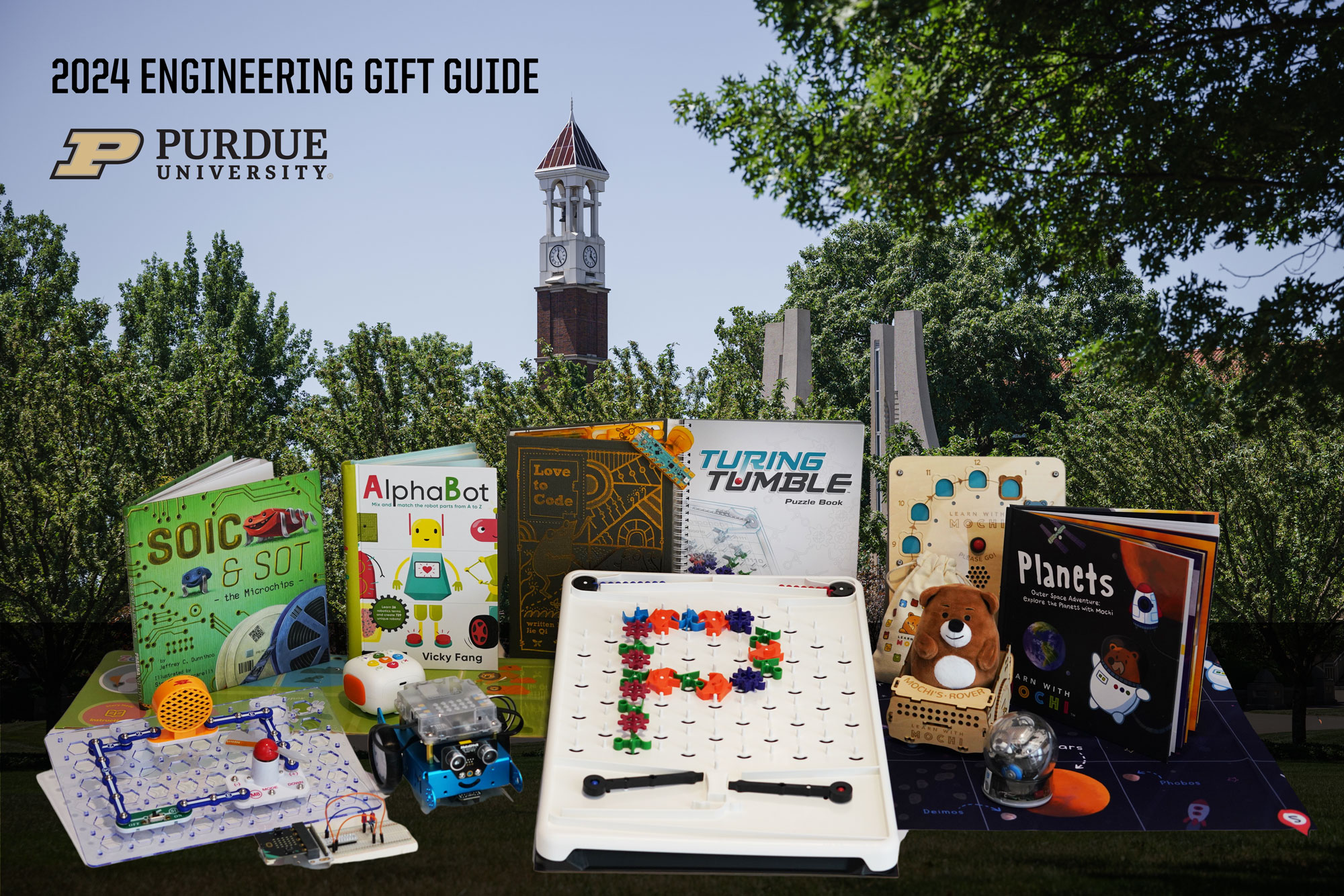Purdue’s 2024 Engineering Gift Guide focuses on microelectronics
Purdue University released its 11th consecutive Engineering Gift Guide on Tuesday (Nov. 19), showcasing 40 gifts to help children and teens better understand and develop an interest in microelectronics.
Purdue University released its 11th consecutive Engineering Gift Guide on Tuesday (Nov. 19), showcasing 40 gifts to help children and teens better understand and develop an interest in microelectronics.
The annual guide is produced by the nonprofit INSPIRE Research Institute for Pre-College Engineering, a research center within the School of Engineering Education (ENE) dedicated to integrating engineering thinking and design into pre-college classrooms, and promoting participation of all students in engineering.
In previous years, the guide featured engineering-based games, toys and books with the potential to help children explore what it means to be an engineer. This year, INSPIRE focused on a specific aspect of cross-disciplinary engineering called microelectronics, which refer to the design and manufacture of very small electronic systems, typically made from a small semiconductor “chip.” Microelectronic chips are found in many common devices, including computers, smart watches, cell phones, cameras, televisions, automobiles, home appliances and much more.
“Microelectronics are crucial to our everyday lives,” said Tamara Moore, a professor of engineering education who directs INSPIRE and SCALE K-12, an ENE research program dedicated to embedding microelectronics learning into K-12 schools and curricula. “But to understand the technology, kids first need to understand that microelectronic chips are integrated circuits, their purpose is to automate something such as a robot, and they need to be programmed through coding. The toys in this year’s guide help make those connections in a fun way.”
The INSPIRE Student Research Team, which is guided by ENE faculty and staff, attempted to choose gifts for all ages and interest levels. The team selected microelectronics-related, highly reviewed items featured in past gift guides, and conducted a thorough internet search of other possible options that fit the criteria. Items were ordered, reviewed and sorted into three categories: circuitry, robotics and coding/programming.
“Personally, I like to review the coding toys, and toys that are more hands-on or digestible to younger kids,” said Daisy Coble, who has served as a student reviewer for three years. Coble is a sophomore studying industrial design who longs to design products that blend creativity, learning and fun. “The team included toys that didn’t have to connect to other technologies, such as apps or an iPhone, because not everyone has access to those things, and connective technologies can go out of fashion quickly.”
From the collection of 40 gifts selected for the gift guide this year, the team chose 10 favorites:
- “SOIC & SOT: The Microchips”
- Mochi Robotics Kit
- Snap Circuits Arcade
- AlphaBot
- micro:bit Starter Kit
- Sphero Bolt
- mBot
- Creative Coding Kit
- Tale-Bot Pro
- Turing Tumble
The full gift guide is available online.
Moore added, “Our top toy this year is a children’s picture book called ‘SOIC & SOT: The Microchips,’ which features two main characters who are microchips. They get separated during the manufacturing process and reunite later in the same household. It’s a cute story that brings alive microelectronics in a fun way, while teaching children how microelectronics are created and how they work.”
With a process based on federally funded INSPIRE research, gift guide reviewers evaluate how well items integrate processes of design; application of STEM knowledge; engineering thinking; concepts of engineers and engineering; engineering tools and processes; issues, solutions and impacts; teamwork; communications related to engineering; computational thinking; and spatial reasoning.
About the School of Engineering Education
As one of the academic divisions in the Purdue University College of Engineering, the School of Engineering Education (ENE) focuses on transforming engineering education based on scholarship and research, and envisions a more inclusive, socially connected and scholarly engineering education. The first school of its kind in the nation, Purdue ENE is a national and global leader of this emerging discipline and maintains a strong research portfolio in pre-college, higher education and engineering workplaces to advance the student experience, as well as improve engineering education culture and workforce practices. ENE manages several research centers, including the INSPIRE Research Institute for Pre-College Engineering and SCALE K-12.
Video: B-roll video and commentary by Tamara Moore can be found at https://www.youtube.com/watch?v=gd3EV16WQvE

